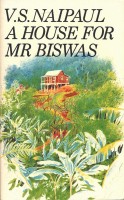kategóriák
- Közlekedés ajánlójegyzék
- Szocreál ajánlójegyzék
- Reklám ajánlójegyzék
- Fotó ajánlójegyzék
- Kínai-japán ajánlójegyzék
- Szentkép ajánlójegyzék
Új árakkal! - Új szentkép ajánlójegyzék II.
- 12 érdekes régiség
 Könyv
Könyv
 Bibliofilia
Bibliofilia
 Régiség
Régiség
 Metszet
Metszet
 Térkép
Térkép
 Fotó
Fotó
 Papírrégiség, Aprónyomtatvány
Papírrégiség, Aprónyomtatvány
 Plakát
Plakát
- Cirkusz
- Modern grafika
- Szocreál
- NER Irodalom
- Egyéb
kosár
üres a kosár
nincs bejelentkezve
Naipaul, V.S. : A House for Mr. Biswas
- leírás
- további adatok
Today is the first day of this blog's existence.My first post would like to be about a book that has attracted much adulation from the literary community at home and abroad. A House for Mr Biswas(1961) is generally viewed by many as Vidiadhar Surajprasad, known to the literary world as V.S Naipaul's "magnum opus". This was Naipaul's fourth novel, after much shorter books such as The Suffrage of Elvira, The Mystic Masseur and a collection of short stories known as Miguel Street. While these books were regarded as very good, they were quite short and lacking in depth. For the record, I disagree with those sentiments.
A House for Mr Biswas centers around the life of Mohun Biswas, a man simply looking to call a place his own. He is viewed by some as being a magnet of bad luck because of being "born the wrong way". His father dying in a swimming accident while trying to save him further enforces this belief. Throughout the book, Biswas tries to assert his independence among domineering characters such as Pandit Jairam, the Tulsi Family and various other characters. Biswas also balances this with the constantly changing demands of his wife and three children. Effortlessly weaving between dark comedy and heart-wrenching drama, Naipaul tells a story of a man's persistence and resilience in a search for autonomy against the backdrop of post colonial Trinidad.
Mohun Biswas seems to be a man constantly stalked by bad luck. To the person who has not read this fantastic novel, this may sound as the stuff that many a comedy is based on. But far from it, in several parts,m it is the makings of drama of the highest order. The book also touches on themes that are even in twenty first century Trinidad are considered taboo and in some cases harmful to national development. Themes such as race, class, an antagonistic look at religion are all covered by Naipaul. In the 1940s/50s,Trinidad is a society that is just coming into it's own and is acquiring more freedoms from the Colonial authorities. While no date is stated in the book pertaining to the written events, one conversant with Trinidad and Tobago's history may assume that they take place between the late thirties, forties, fifties and early sixties. It also touches on the real and sometimes imagined disconnect of people who live in suburban and urban areas with those who live in rural communities.
Race is also discussed in the book. In a cosmopolitan society such as Trinidad, the topic of race will inevitably come up and so-called racial chaffing sporadically occurs in Trinidad. Secondly, racism in Trinidad is not really the type of racism that exists elsewhere. The racism(if it may be even called that) is not infectious, effervescent and corrosive. That is not to say it does not exist. Biswas first experiences the chaffing of early Indo-Afro relations in Trinidad in an incident that takes place at the Tulsi's shop. An Afro-Trinidadian woman asked for a pair of flesh-colored stockings and was given black colored stockings by Shama, one of the younger members of the house. This caused great anger and was only diffused by the calm but manipulative Mrs Tulsi. It should be noted however that this incursion was precipitated by Biswas professing his love for Shama in writing. During this particular passage, Naipaul displays contempt and at times scorn for certain institutions and practices which have become entrenched in Hindu culture such as child marriage and the co-habitation of matrimonial families. The Tulsi family is a perfect example of this, as they move hastily to have him betrothed to Shama soon after meeting her mother Mrs Tulsi. This in turn leads to the main theme of the novel: the desire of one man battered and bruised by the tempestuous and fickle sea of circumstance to be independent.
| állapot: |     |
| kategória: | Könyv > Idegennyelvű könyvek > Angol nyelvű > Angol nyelvű irodalom > |
| kiadó: | Penguin, 1983 |
| cikkszám / ISBN: | 9780140030259 |
| kötés: | fűzve |
| oldalszám: | 589 |
| könyv nyelve: | angol |













 Telefon:
Telefon: E-mail:
E-mail:







